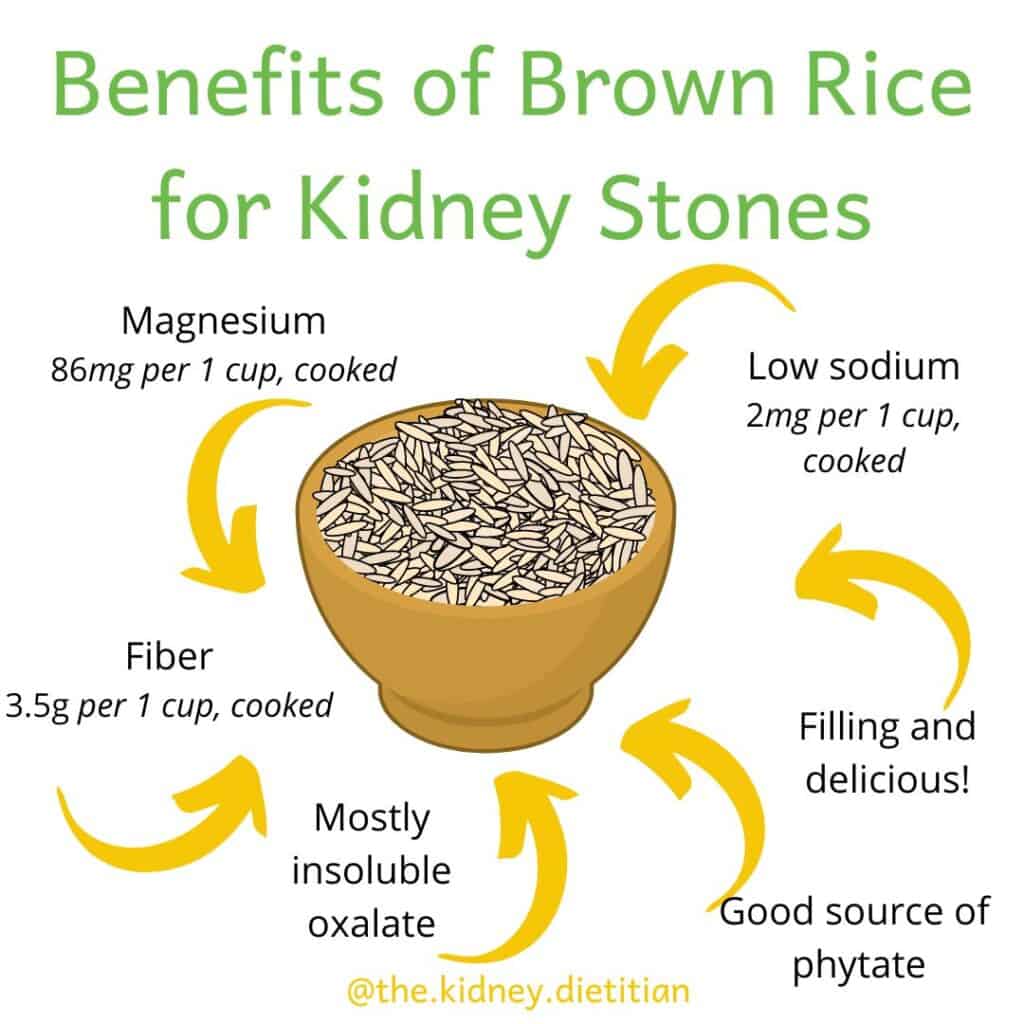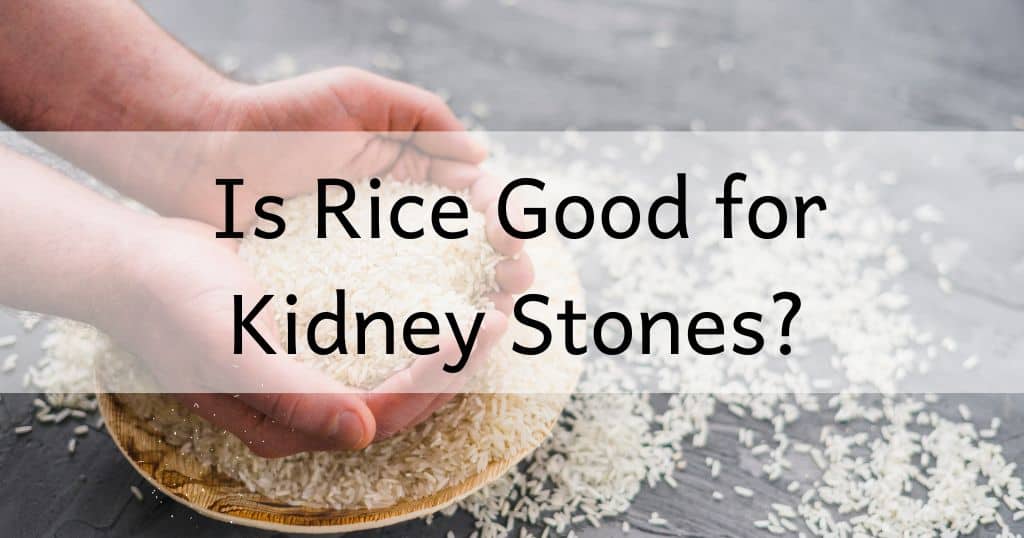Rice is a staple for many people across the world. For good reason, it is delicious! Rice is a great source of carbohydrate and energy. It is a great background for so many tasty dishes like curry, stir fry or seasoned beans. Or, rice can be the star of the show in dishes like Jollaf rice or Biryani.
If you’ve had kidney stones, you may be wondering if rice is okay. Look for further! Read on to learn everything you need to know about rice and kidney stones.
Table of Contents
All About Rice
Rice is a grain and staple food for many cultures around the world. There are many types of rice, including my favorites: wild, basmati and arborio rice.
Like all grains, rice is a great source of carbohydrate. If in a whole grain form, rice is a wonderful way to get in fiber, vitamins and minerals.
Is Rice Good for Kidney Stones?
There is nothing about rice that is especially good for kidney stones. But, rice isn’t bad for kidney stones either.
Rice, and other carbohydrates can ad should be a part of a healthy, balanced diet or kidney stones.
The Best Kind of Rice for Kidney Stones
Is White Rice Good for Kidney Stones?
Historically, white rice was recommended for kidney stones. White rice has less oxalate than brown rice. However, we know a lot more about kidney stone nutrition now. I do not recommend white rice for most people with kidney stones.
Huh!? Bear with me.
Yes, white rice does have less oxalate compared to brown rice. However, it also has less fiber, vitamins, minerals and other things that are good for you.
Plus, a strict low oxalate diet is not the key to stopping kidney stones for most people. Some people with oxalate stones do need to limit oxalate, but many do not. You might need to limit oxalate if your oxalate is high on a 24-hour urine test.
| Nutrition Content of White and Brown Rice | ||
|---|---|---|
| White Rice (1 cup, cooked) | Brown Rice (1 cup, cooked) | |
| Protein (grams) | 4.4 | 4.5 |
| Carbohydrate (grams) | 53 | 46 |
| Fat (grams) | 0.5 | 2 |
| Fiber (grams) | 0.6 | 3.5 |
| Sodium (milligrams) | 0 | 2 |
| Calcium (milligrams) | 6 | 20 |
| Magnesium (milligrams) | 24 | 86 |
| Phosphorus (grams) | 69 | 150 |
| Potassium (milligrams) | 54 | 154 |
| Oxalate (milligrams) | 4 | 24 |
Nutrition for kidney stone prevention is much more than oxalate. How much sodium, protein, sugar and calcium you eat are usually much more important than oxalate.
For most people, the simple fact that white rice has less oxalate just doesn’t justify the lower fiber and other health-promoting nutrients. Especially when a low oxalate diet is less important than we once thought. (1)
Benefits of Brown Rice for Kidney Stones
Magnesium
Magnesium is new on the scene for kidney stone nutrition. People who have lower urine magnesium levels tend to make more kidney stones. (2) (3) Magnesium can bind with oxalate, making that oxalate unable to bind with calcium and form a kidney stone.
In general, whole grains like brown rice are higher in magnesium compared to refined grains. Brown rice has about 3 1/2 times more magnesium than white rice.
More about magnesium and kidney stones.
Phytate
Phytate is another interesting target for kidney stone nutrition. Phytate is found in many plant foods, especially whole grains like brown rice.
Phytate (or, phytic acid) is most known for being an “anti-nutrient” inhibiting the absorption of some nutrients. However, phytate may also help prevent kidney stones. (4) (5)
Phytate might be one of the reasons why people who eat lots of plants tend to have less kidney stones. (6)

Insoluble Oxalate
Much of the oxalate in brown rice (and most whole grains) is insoluble. (7) Soluble oxalate is more concerning because more of it is absorbed into your body. (8)
So, even though brown rice has more oxalate in it, a lot of this oxalate is probably not getting absorbed anyway.
Fiber
Lastly, I recommend brown rice for people with kidney stones because it is better for general health. Brown rice, and other whole grains have more fiber compared to refined grains. Most of us are getting nowhere near enough fiber. (9) Fiber can help combat heart disease, diabetes, cancer, constipation and so much more! (10)
Whole grains are recommended by the Dietary Guidelines for Americans and the American Heart Association.
Nutrition for kidney stones must address your total health, not just kidney stones.
Types of Brown Rice
Brown rice is a big umbrella term that encompasses a many different types of rice. All of these kinds rices have more fiber and good stuff discussed above compared to their white or refined counterparts.
- Brown basmati rice
- Short grain brown rice
- Long grain brown rice
- Brown jasmine rice
Can Eating Raw Rice Cause Kidney Stones
I’ve had this question before, so I wanted to address it. No, eating raw rice will not cause kidney stones. The nutrition content of raw and cooked rice is nearly the same.
There is nothing in raw rice, specifically, that would cause kidney stones.
What About Arsenic?
Sounds scary, I know. But we consume arsenic in many different foods including fruits, vegetables, leafy greens and rice. For most of us, arsenic is not a cause for concern.
People in the United States consume nowhere near the amount of arsenic that could cause negative effects. (11) However, rice does tend to be one of the biggest contributors to arsenic in our diet.
I recommend consuming a variety of grains, fruits and vegetables to help reduce exposure. This is good practice anyway to get a varied profile of vitamins, minerals, antioxidants and other phytochemicals.
If you are concerned about arsenic in rice, boiling rice in water with a ratio of 6:1 has been shown to reduce arsenic levels. Soaking rice overnight and draining that water may also reduce arsenic levels. However, these methods also reduce vitamins and minerals.
Learn more about arsenic in food.
Happy Eating!


Hi Melanie: Last week I was diagnosed with 3 mm. ureteral stone with hydronephrosis. I came across your blog last week after looking at so many different streams of information about kidney stones. There is so much contradicting about what one should eat and what not to eat on the internet. It gets so confusing! Your site is by far the best one to explain the how and why kidney stones plague so many. Your recipes are wonderful and I feel like I have my own personal dietician now. I have been following your wonderful recipes and advice and I thank you so much for your wonderful site!
You are too kind! I’m so glad you’ve found me. Thank you for the lovely comment!
Hi Melanie,
I am allergic to wheat , chocolate, nuts, dairy. I eat only cooked vegetables and no fruit except bananas. I just don’t understand what I can and shouldn’t eat to make kidney stones as my stones are calcium oxalate. Thank you for helping me with what to eat.
Hi Judy! Nutrition for calcium oxalate stones is totally different for each person, depending on your 24 hour urine test. I help people understand what THEY should be eating in Kidney Stone Nutrition School. I would love to help you navigate your limited diet and still prevent stones!
Can you explain this paradox: calcium can help excrete oxalate but can also bind with oxalate to create stones.
Can you list range of calcium amounts in 24 hour urine tests?
Kate
That is a very counterintuitive paradox! This article about calcium and this one about calcium oxalate stone nutrition provide more details.
Can you list best calcium range in 24 hour urine analysis?
Can you explain this paradox: calcium helps excrete oxalate, but can also bind and create stones?
Confusing.
Thank you.
Kate
For more information about how to interpret that 24 hour urine test, you can check out this article or my guide for understanding your 24 hour urine test results.
I have had high oxalate levels and have been avoiding brown rice because of its higher oxalate level. This blog has changed my mind, and I’m looking forward to seeing whether switching to brown rice will help reduce my puzzling excess calcium loss.
I’m so glad to share some new information! That calcium loss in urine is VERY common in kidney stone formers (actually the most common cause of kidney stones – not oxalate!). There is quite a bit you can do from a nutrition standpoint to help with that. I have a few resources to dive into all of the specifics and everything that urine test tells you = my kidney stone diet guide and course would be perfect!
thank you Melanie! very interesting information!
You are so welcome! Glad it was useful to you!